牛津译林版Unit 6 Outdoor fun-Grammar课件(29张)
文档属性
| 名称 | 牛津译林版Unit 6 Outdoor fun-Grammar课件(29张) | 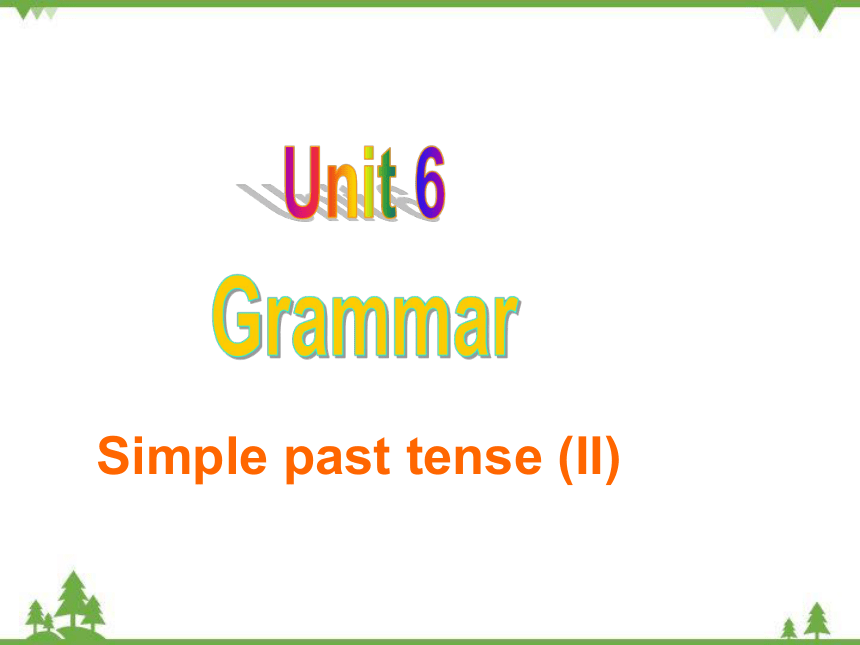 | |
| 格式 | ppt | ||
| 文件大小 | 914.5KB | ||
| 资源类型 | 教案 | ||
| 版本资源 | 牛津译林版 | ||
| 科目 | 英语 | ||
| 更新时间 | 2022-06-02 20:41:17 | ||
图片预览

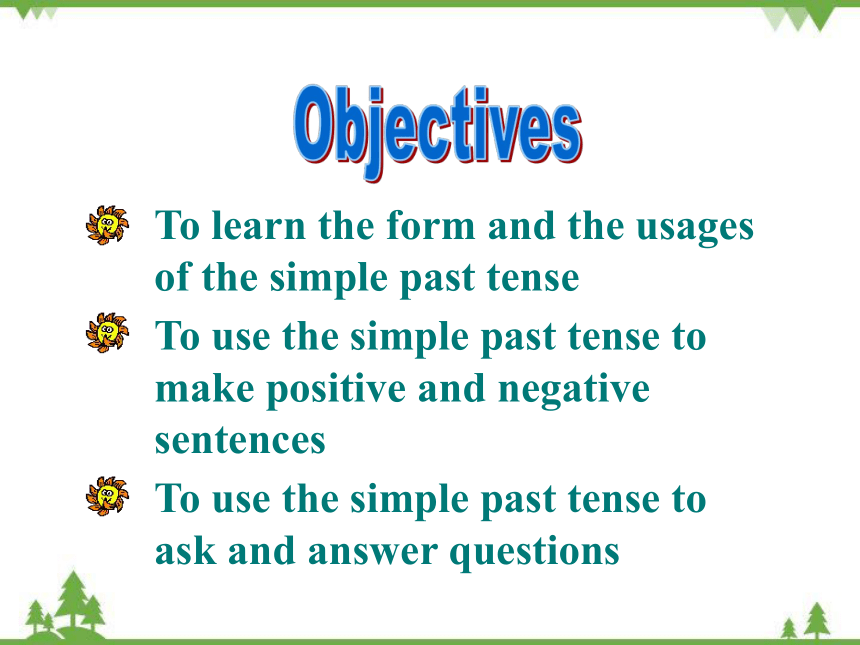
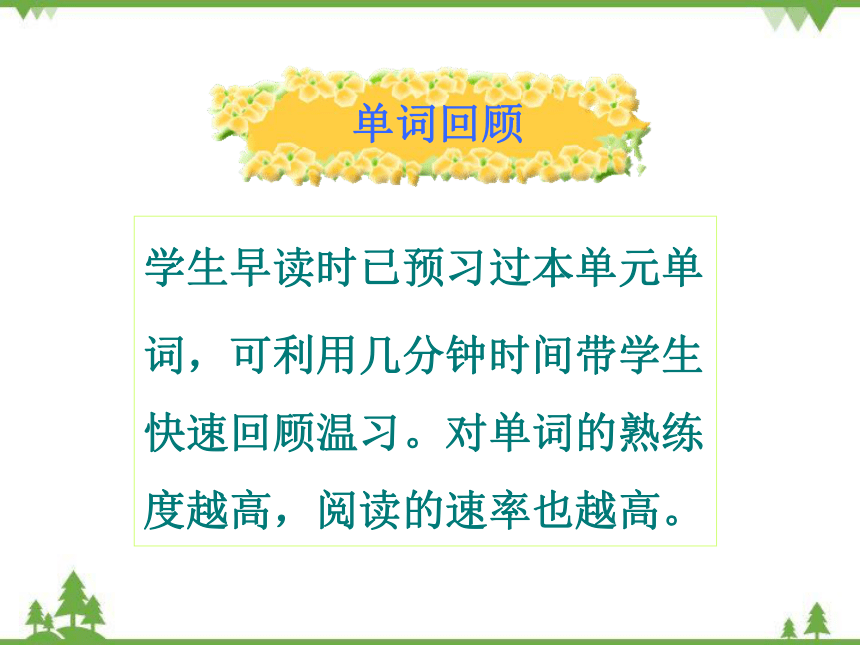
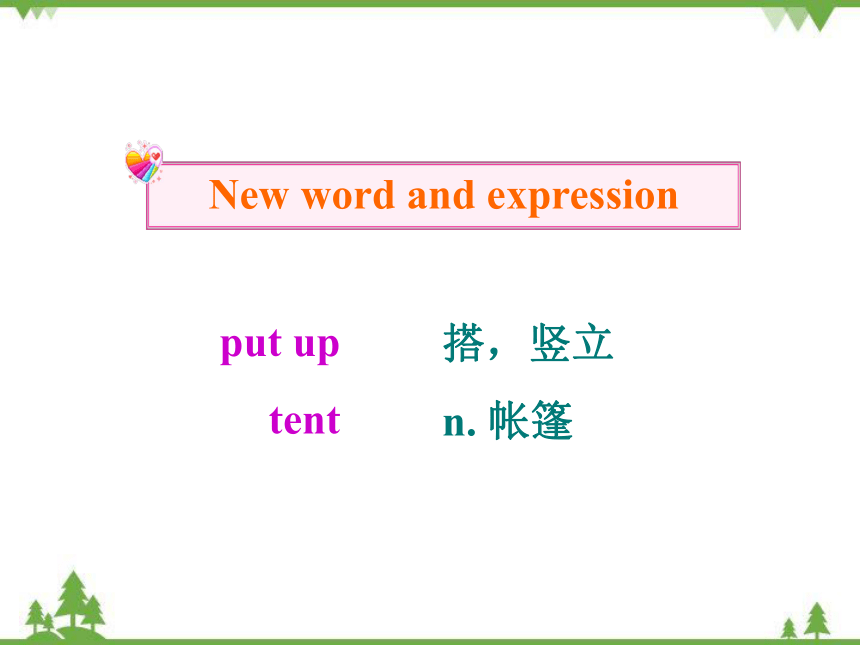
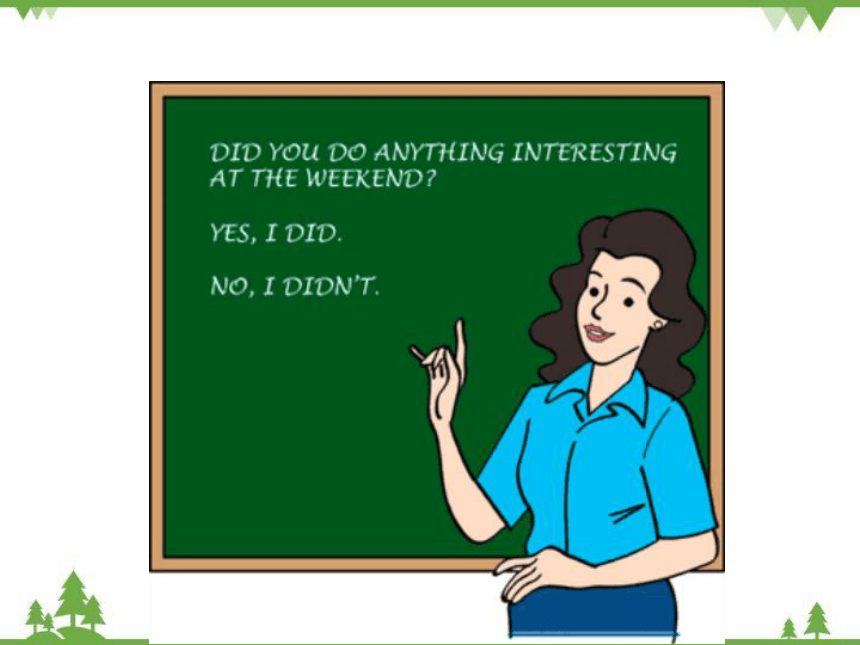
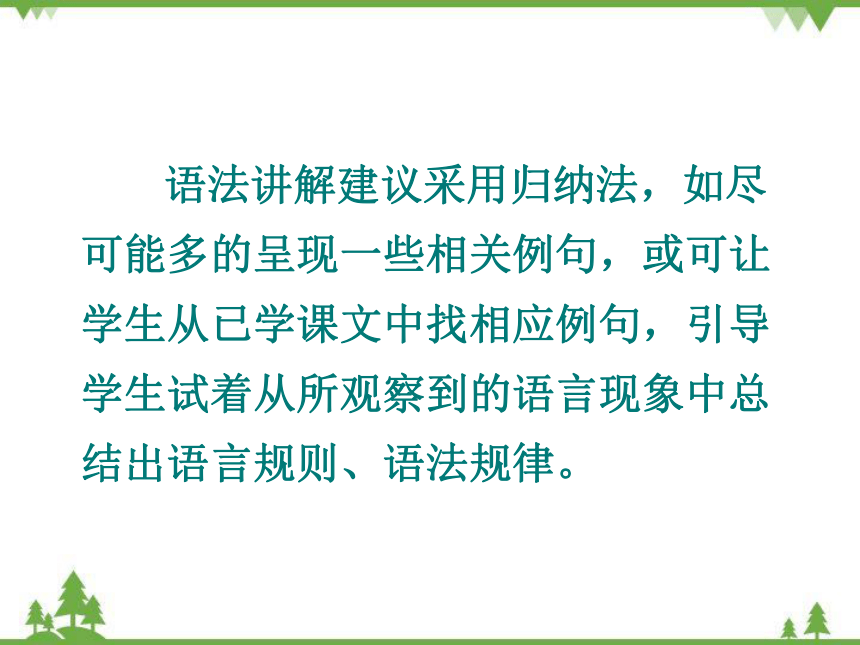
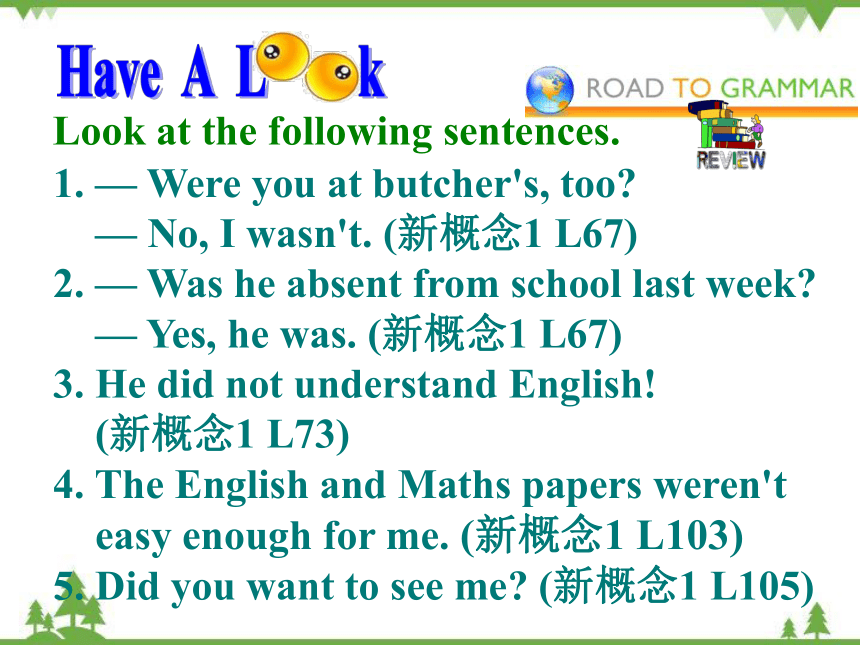
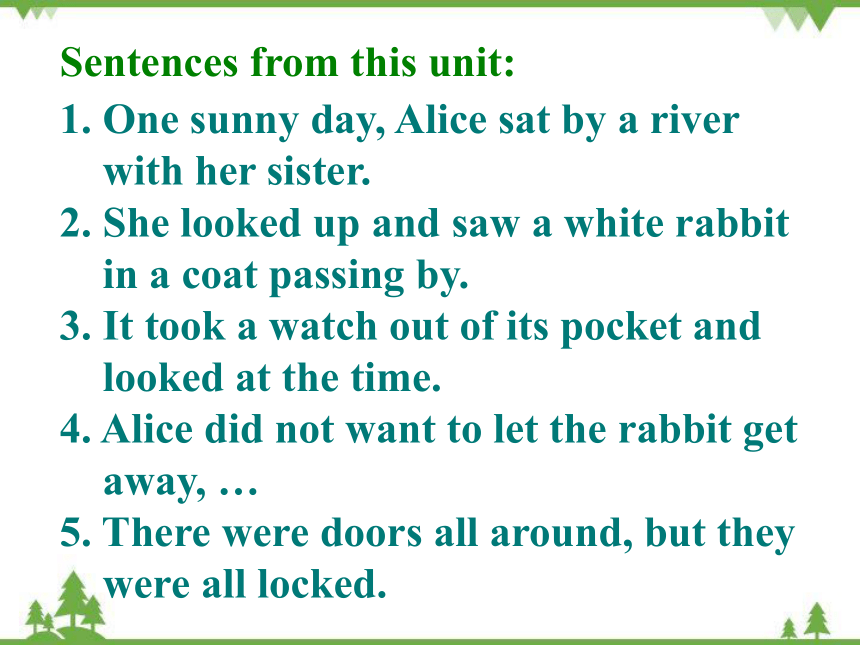

文档简介
(共31张PPT)
Simple past tense (II)
To learn the form and the usages of the simple past tense
To use the simple past tense to make positive and negative sentences
To use the simple past tense to ask and answer questions
学生早读时已预习过本单元单
词,可利用几分钟时间带学生快速回顾温习。对单词的熟练度越高,阅读的速率也越高。
单词回顾
put up
tent
搭,竖立
n. 帐篷
New word and expression
语法讲解建议采用归纳法,如尽
可能多的呈现一些相关例句,或可让
学生从已学课文中找相应例句,引导
学生试着从所观察到的语言现象中总
结出语言规则、语法规律。
Look at the following sentences.
1. — Were you at butcher's, too
— No, I wasn't. (新概念1 L67)
2. — Was he absent from school last week
— Yes, he was. (新概念1 L67)
3. He did not understand English!
(新概念1 L73)
4. The English and Maths papers weren't
easy enough for me. (新概念1 L103)
5. Did you want to see me (新概念1 L105)
1. One sunny day, Alice sat by a river
with her sister.
2. She looked up and saw a white rabbit
in a coat passing by.
3. It took a watch out of its pocket and
looked at the time.
4. Alice did not want to let the rabbit get
away, …
5. There were doors all around, but they
were all locked.
Sentences from this unit:
to test your sense of observation
to test your ability of short-term memory
to test your ability to highlight the language points
Guess
1. — _____ you at butcher's, too
— No, I ______.
2. — ____ he absent from school last
week
— Yes, he ____.
3. He ___ not understand English!
4. The English and Maths papers
_______ easy enough for me.
5. ___ you want to see me
Were
wasn't
Was
was
did
weren't
Did
6. One sunny day, Alice ___ by a river
with her sister.
7. She ______ up and ____ a white rabbit
in a coat passing by.
8. It ____ a watch out of its pocket and
______ at the time.
9. Alice ___ not want to let the rabbit get
away, …
10. There _____ doors all around, but
they _____ all locked.
sat
looked
saw
took
looked
did
were
were
— It's dangerous to swim here. Look at
the sign.
— Oh, I ______ notice it. Thanks for
telling me.
A. haven't B. won't
C. don't D. didn't
— Where ______ you ______ lunch
— At home. There was no school lunch.
A. did; have B. are; having
C. will; have D. do; have
以上我们已经通过归纳总结和练习对本课的语法内容有了一定的了解,下面就让我们根据之前练习的考察情况进一步选择讲解
该语法项的重难点。
一般过去时的肯定式、否定式和一般疑问式的构成
肯定式:
主语 + 动词的过去式 + …
We heard a sound.
否定式:
主语 + did + not + 动词原形 + …
We did not / didn’t hear a sound.
一般疑问式:
Did + 主语 + 动词原形 + …
Did you hear a sound
Yes, we did. / No, we didn’t.
be
am
is
are
was
were
肯定式:主语 + was / were + …
否定式:主语 + was not (wasn’t) /
were not (weren’t) + …
一般疑问式:
Was / Were + 主语 + …
Yes, 主语 + was / were.
No, 主语 + was not (wasn’t) / were not (weren’t).
Simple past tense of the verb ‘to be’
一般过去时
肯定式 主语 + was / were + 其他. 主语 + 动词的过去式 + 其他.
否定式 was
主语 + not + 其他.
were 主语 + didn’t + 动词原形 + 其他.
一般疑
问句及
回答 Was / Were + 主语 + 其他
(肯) Yes, 主语 + was / were.
(否) No, 主语 + wasn’t /
weren’t. Did + 主语 + 动词
原形 + 其他
(肯) Yes, 主语 + did.
(否) No, 主语 +
didn’t.
巧记动词过去时态
动词一般过去时,表示过去发生事;
be用was或用were, have, has变had;
谓语动词过去式,过去时间做标志;
一般动词加-ed,若是特殊得硬记。
否定句很简单,主语之后didn’t添;
疑问句也不难,did放在主语前;
谓语之前有did,谓语动词需还原;
动词若是was, were,否定就把not添。
1. Mr. Black is going to marry a girl he
______ in Japan last year.
(2011内蒙古包头)
A. meets B. met
C. has met D. would meet
2. — Do you know who cleaned the
blackboard, Tina
— Yes. John ______. (2011四川德阳)
A. do B. does C. did
I. 选择正确答案。
3. — What did Mr. Smith do before he
came to China
— He ______ in a car factory.
(2011山东)
A. works B. worked
C. is working D. will work
4. Hello! I'm very glad to see you. When
______ you ______ here
(2011山东青岛)
A. did; arrive B. will; arrive
C. have; arrived D. are; arriving
5. Paul and I ______ tennis yesterday. He
did much better than I. (2011北京)
A. play B. will play
C. played D. are playing
6. — Where were you last Saturday
— I ____ in the Capital Museum.
(2012北京)
A. am B. will be
C. was D. have been
1. Lucy did her homework at home.
(否定句)
Lucy _______ _____ her homework
at home.
2. He found some meat in the fridge.
(一般疑问句)
______ he _____ ______ meat in the
fridge
didn’t
do
any
find
Did
II. 改写句子。
3. She stayed there for a week.
(划线部分提问)
_____ _____ ____ she _____ there
4. There was some orange juice in the
cup. (一般疑问句)
_____ there _____ orange juice in the
cup
stay
did
long
How
any
Was
III. 翻译句子。
1. 上周末你做什么了?
2. 星期六的早上,我踢足球了。
3. 星期天的晚上,我看电视了。
On Saturday morning, I played soccer.
On Sunday night, I watched TV.
What did you do last weekend
4. 我过了一个忙碌但却有趣的周末。
I had a busy but interesting
weekend.
5. Emma每天都看电视。可是昨天她
没有看。
Emma watches TV everyday, but she
didn’t watch TV yesterday.
6. 今天早上我遇到了林涛。
I met Lin Tao this morning.
7. 他过去抽烟,但现在不抽了。
He smoked in the past, but not now.
8. 她刚才还在这里。
She was here just now.
9. 他什么时候出生的?2000年。
When was he born In 2000.
10. 我在打扫教室的时候,发现地上有
块表。
When I cleaned the classroom, I
found a watch on the floor.
To preview Integrated skills on Pages 75 and 76
To learn to talk about a day out
1. Review the grammar part.
2. Do Part A and Part B
on Page 74.
Simple past tense (II)
To learn the form and the usages of the simple past tense
To use the simple past tense to make positive and negative sentences
To use the simple past tense to ask and answer questions
学生早读时已预习过本单元单
词,可利用几分钟时间带学生快速回顾温习。对单词的熟练度越高,阅读的速率也越高。
单词回顾
put up
tent
搭,竖立
n. 帐篷
New word and expression
语法讲解建议采用归纳法,如尽
可能多的呈现一些相关例句,或可让
学生从已学课文中找相应例句,引导
学生试着从所观察到的语言现象中总
结出语言规则、语法规律。
Look at the following sentences.
1. — Were you at butcher's, too
— No, I wasn't. (新概念1 L67)
2. — Was he absent from school last week
— Yes, he was. (新概念1 L67)
3. He did not understand English!
(新概念1 L73)
4. The English and Maths papers weren't
easy enough for me. (新概念1 L103)
5. Did you want to see me (新概念1 L105)
1. One sunny day, Alice sat by a river
with her sister.
2. She looked up and saw a white rabbit
in a coat passing by.
3. It took a watch out of its pocket and
looked at the time.
4. Alice did not want to let the rabbit get
away, …
5. There were doors all around, but they
were all locked.
Sentences from this unit:
to test your sense of observation
to test your ability of short-term memory
to test your ability to highlight the language points
Guess
1. — _____ you at butcher's, too
— No, I ______.
2. — ____ he absent from school last
week
— Yes, he ____.
3. He ___ not understand English!
4. The English and Maths papers
_______ easy enough for me.
5. ___ you want to see me
Were
wasn't
Was
was
did
weren't
Did
6. One sunny day, Alice ___ by a river
with her sister.
7. She ______ up and ____ a white rabbit
in a coat passing by.
8. It ____ a watch out of its pocket and
______ at the time.
9. Alice ___ not want to let the rabbit get
away, …
10. There _____ doors all around, but
they _____ all locked.
sat
looked
saw
took
looked
did
were
were
— It's dangerous to swim here. Look at
the sign.
— Oh, I ______ notice it. Thanks for
telling me.
A. haven't B. won't
C. don't D. didn't
— Where ______ you ______ lunch
— At home. There was no school lunch.
A. did; have B. are; having
C. will; have D. do; have
以上我们已经通过归纳总结和练习对本课的语法内容有了一定的了解,下面就让我们根据之前练习的考察情况进一步选择讲解
该语法项的重难点。
一般过去时的肯定式、否定式和一般疑问式的构成
肯定式:
主语 + 动词的过去式 + …
We heard a sound.
否定式:
主语 + did + not + 动词原形 + …
We did not / didn’t hear a sound.
一般疑问式:
Did + 主语 + 动词原形 + …
Did you hear a sound
Yes, we did. / No, we didn’t.
be
am
is
are
was
were
肯定式:主语 + was / were + …
否定式:主语 + was not (wasn’t) /
were not (weren’t) + …
一般疑问式:
Was / Were + 主语 + …
Yes, 主语 + was / were.
No, 主语 + was not (wasn’t) / were not (weren’t).
Simple past tense of the verb ‘to be’
一般过去时
肯定式 主语 + was / were + 其他. 主语 + 动词的过去式 + 其他.
否定式 was
主语 + not + 其他.
were 主语 + didn’t + 动词原形 + 其他.
一般疑
问句及
回答 Was / Were + 主语 + 其他
(肯) Yes, 主语 + was / were.
(否) No, 主语 + wasn’t /
weren’t. Did + 主语 + 动词
原形 + 其他
(肯) Yes, 主语 + did.
(否) No, 主语 +
didn’t.
巧记动词过去时态
动词一般过去时,表示过去发生事;
be用was或用were, have, has变had;
谓语动词过去式,过去时间做标志;
一般动词加-ed,若是特殊得硬记。
否定句很简单,主语之后didn’t添;
疑问句也不难,did放在主语前;
谓语之前有did,谓语动词需还原;
动词若是was, were,否定就把not添。
1. Mr. Black is going to marry a girl he
______ in Japan last year.
(2011内蒙古包头)
A. meets B. met
C. has met D. would meet
2. — Do you know who cleaned the
blackboard, Tina
— Yes. John ______. (2011四川德阳)
A. do B. does C. did
I. 选择正确答案。
3. — What did Mr. Smith do before he
came to China
— He ______ in a car factory.
(2011山东)
A. works B. worked
C. is working D. will work
4. Hello! I'm very glad to see you. When
______ you ______ here
(2011山东青岛)
A. did; arrive B. will; arrive
C. have; arrived D. are; arriving
5. Paul and I ______ tennis yesterday. He
did much better than I. (2011北京)
A. play B. will play
C. played D. are playing
6. — Where were you last Saturday
— I ____ in the Capital Museum.
(2012北京)
A. am B. will be
C. was D. have been
1. Lucy did her homework at home.
(否定句)
Lucy _______ _____ her homework
at home.
2. He found some meat in the fridge.
(一般疑问句)
______ he _____ ______ meat in the
fridge
didn’t
do
any
find
Did
II. 改写句子。
3. She stayed there for a week.
(划线部分提问)
_____ _____ ____ she _____ there
4. There was some orange juice in the
cup. (一般疑问句)
_____ there _____ orange juice in the
cup
stay
did
long
How
any
Was
III. 翻译句子。
1. 上周末你做什么了?
2. 星期六的早上,我踢足球了。
3. 星期天的晚上,我看电视了。
On Saturday morning, I played soccer.
On Sunday night, I watched TV.
What did you do last weekend
4. 我过了一个忙碌但却有趣的周末。
I had a busy but interesting
weekend.
5. Emma每天都看电视。可是昨天她
没有看。
Emma watches TV everyday, but she
didn’t watch TV yesterday.
6. 今天早上我遇到了林涛。
I met Lin Tao this morning.
7. 他过去抽烟,但现在不抽了。
He smoked in the past, but not now.
8. 她刚才还在这里。
She was here just now.
9. 他什么时候出生的?2000年。
When was he born In 2000.
10. 我在打扫教室的时候,发现地上有
块表。
When I cleaned the classroom, I
found a watch on the floor.
To preview Integrated skills on Pages 75 and 76
To learn to talk about a day out
1. Review the grammar part.
2. Do Part A and Part B
on Page 74.
